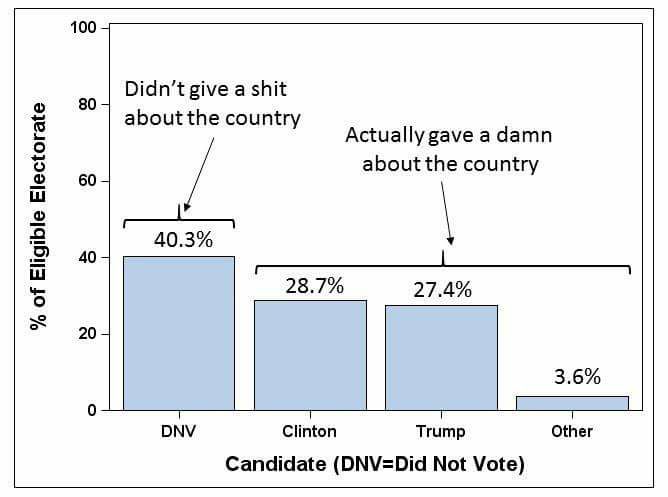A new analysis finds that though voting eligible Asians were up 35 percent between 2010 and 2020, Latinos increased 23 percent and the Black population increased by 6 percent even as Whites decreased 2 percent, minorities didn't vote in numbers similar to their eligible voter population.
Overall, they are a larger part of the 40 percent of the eligible voters who don't bother. It is easy for political activists to complain about the other party but the real issue is the people who do nothing at all. They don't believe Biden or Trump, Republicans or Democrats, really care about them as much as they care about consolidating power. Inflation is up, incomes are down, everything is more expensive, while political parties insist only more government is the answer.

The 2016 election problem wasn't red states, blue states, or the electoral college, it was that people didn't vote.
Though the listed minorities are 30 percent of eligible voters, only 22 percent do. Still, that isn't a crisis, since 22 out of 30 is a far better ratio than the 32 out of 70 not voting among Whites. Both parties could have substantial gains if they appealed on issues that have direct impact. Instead of doing that, Black voters had a wider gap in the last election, from a 17 percent to 20 percent gap compared to Whites. Democrats treat them as 'in the bag' so they don't try to compete while Republicans don't bother because they say they won't vote Republican. So voters don't bother.
Only Asians had their participation gap narrow, perhaps because they are a minority that does not vote as a group for either party. Many of them moved to the US to get the better opportunity a meritocracy provides, while their children are discriminated against by college hiring committees in favor of Blacks and Latinos - and universities identify overwhelmingly as Democrats.
The authors try to make it a racial issue, and argue that only more government will fix it, in the way of even more reforms or making it even easier for people who don't care to cast a vote - which is a very California thing to claim despite the evidence showing otherwise. “Race disparities remain entrenched in our electoral system and continue to leave voters of color behind,” says Professor Mindy Romero from the University of Southern California Center for Inclusive Democracy.
More Latinos than Blacks play baseball, and a social justice activist might claim that means baseball is racist and needs reforms and more regulation. That doesn't make the claim valid and insisting that racism prevents voting when minorities actually vote more than white people doesn't add up.
What will help is for a new generation of politicians that represent the public - not fringes like Matt Gaetz or Alexandria Ocasio-Cortez, and not older leaders like Trump or Biden - to understand the motivations of people who don't frame their identity through manufactured red and blue lenses.




Comments